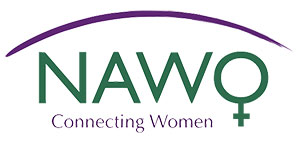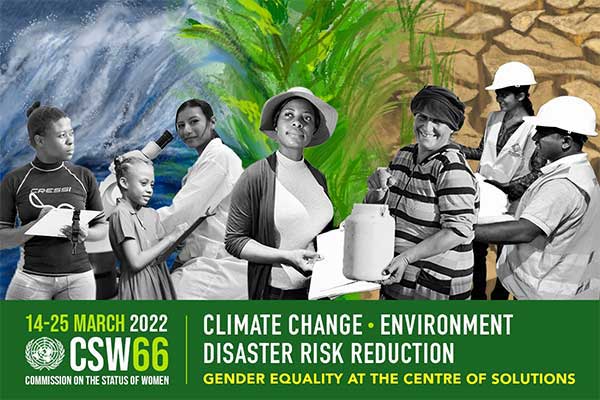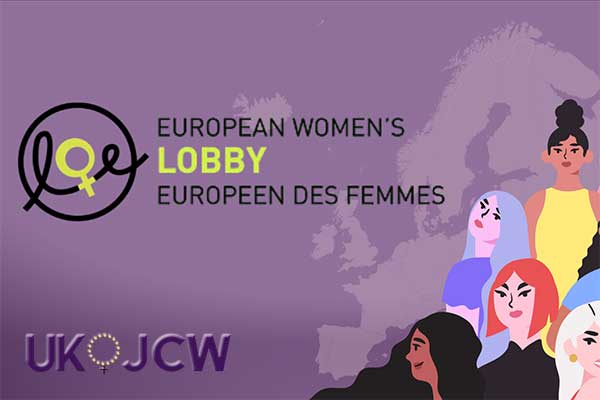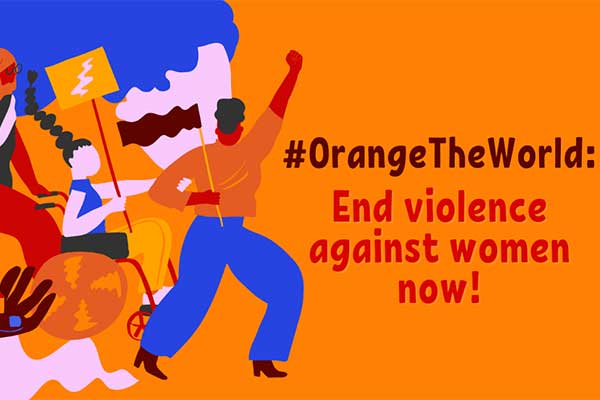CSW61: An overview
The UN Headquarters in New York played host to government representatives, NGOs, and UN agencies from 13-24 March 2017 for the 61st Commission on the Status of Women.
Chair H.E. Mr. Antonio de Aguiar Patriota spoke for many when he highlighted the “centrality of gender equality and the empowerment of all women and girls to sustainable development and poverty eradication, and progress across all the sustainable goals and targets”.
CSW61 was arranged around three major themes: the Priority theme of “ Women’s Economic Empowerment”, the Review theme of “Implementation of the MDGs”, and the Emerging Issue of “Indigenous Women’s Empowerment”. Our members attended talks, panels, group discussion and other side-events on all these three themes.
From these, we identified our own three major structural ideas which emerged quite clearly from the experiences of CSW Alliance members’ at the 61st session, as they worked hard to meet people, learn new information, and get their concerns onto the table for consideration. These positive ideas were communication, solidarity, and progress.
Communication
One of the major obstacles to progress in women’s equality and empowerment is a breakdown in communication. The International Anglican Women’s Network sponsored this side-event to encourage audience members to “listen across their differences”, enabling the empowerment of women through true understanding of each other’s knowledge, experience and cultural transformation.

As well as the use of Twitter by NAWO, the CSW Alliance, and their members, Jenny & Rachel from The National Council of Women GB also decided to create a blog about their CSW experience, allowing members and interested parties worldwide to read and learn. Their blog can be found here.
Senegal led an ICT forum for young women in Africa, supported by UNESCO, as they learnt the basics of code – one of the future’s main means of communication, no doubt, and a crucial way to promote the continued speed of development in countries where women are gradually gaining stronger and stronger voices.
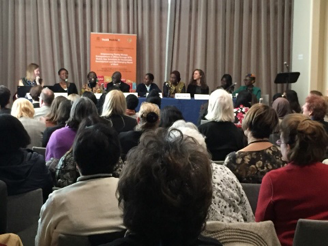
Solidarity
Attendees recognised the importance of solidarity with those women unable to attend CSW61 this year because of “anti-migrant, anti-Muslim, anti-refugee policies, and because of other forms of oppression and marginalisation”. It was widely agreed among members of the CSW Alliance that while a boycott of CSW61 in its entirety would have been the most true form of solidarity, it was crucial to seize the chance to attempt to change the situation for women worldwide at an official UN-run commission.
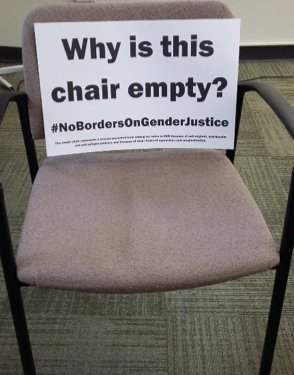
Speakers at the Youth Forum were “very clear about assuming the presence of LGBTIQ+ people in and for global development”, according to UKNGOAlliance. Youth discussions in general seemed to work within this framework more automatically than others, and Jacob’s introduction here is an important message of solidarity across the entire gender equality movement.
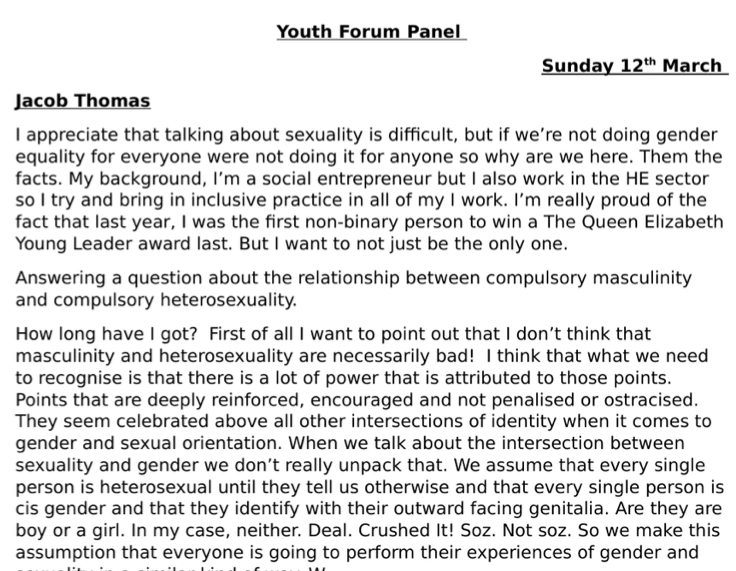
Pam Rajput, head of the High Level Committee appointed in 2012 to make a comprehensive study on the status of women since 1989, explained that “we need a paradigm shift away from current discourses of economic empowerment which focus on the individual and microscale, to focus on the humanitarian, the egalitarian, and in such a way that we do not exploit our planet”. Solidarity with all human beings, as well as with the planet, was emphasised across many events at CSW61.
Progress
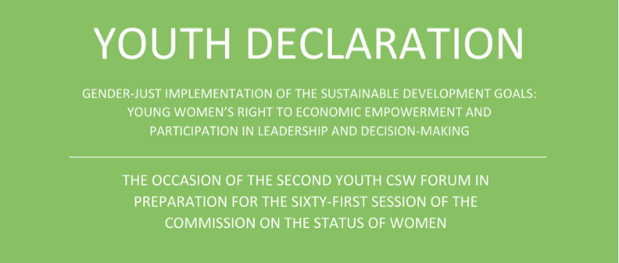 Members of the Youth CSW Forum for CSW61 created their own declaration to member states, calling for them to “recognise that gender is not binary”, to “prioritize marginalized voices”, to “achieve the SDGs”, and to “actively engage all young men, male-identifying and trans-masculine people” in the work towards gender equality. The involvement of young voices is one of the key ways in which CSW61 proved its centrality to a better future.
Members of the Youth CSW Forum for CSW61 created their own declaration to member states, calling for them to “recognise that gender is not binary”, to “prioritize marginalized voices”, to “achieve the SDGs”, and to “actively engage all young men, male-identifying and trans-masculine people” in the work towards gender equality. The involvement of young voices is one of the key ways in which CSW61 proved its centrality to a better future.
CSW61’s Emerging Issue was that of the empowerment of indigenous women, not one which has been much talked about in mainstream gender equality discussions. The promotion of this theme at this Commission, while not aiming to make assumptions as to the similarity of indigenous women’s situations across the world, marks an important step towards the recognition of different gender equality priorities across the movement, and the crucial compatibility of these different priorities in a still-united movement.
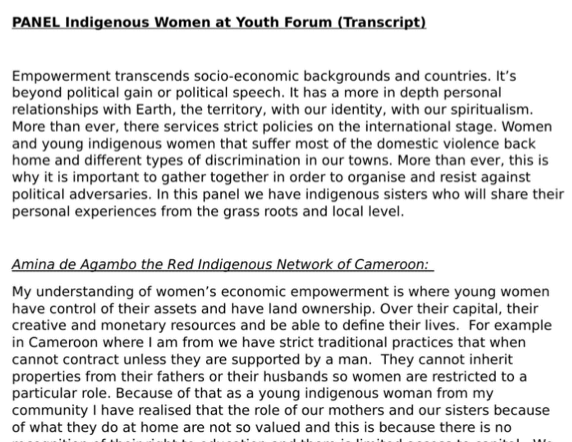
As with every Commission on the Status of Women, CSW61’s main output was the 2017 Agreed Conclusions, negotiated by all states and confirming the pledges, goals and targets set out during the ten-day period. Among other points, the Agreed Conclusions state that:
- “The Commission strongly condemns violence against women and girls in all forms in public and private spaces”
- “The Commission recognizes that…progress in achieving women’s economic empowerment in the changing world of work has been insufficient”
- “The Commission recognizes the positive contribution of migrant women and girls, in particular women migrant workers, to sustainable development in countries of origin, transit and destination”
- “The Commission recognizes the importance of fully engaging men and boys as agents and beneficiaries of change for the achievement of gender equality and the empowerment of all women and girls”
The Commission strongly encourages Government at all levels and other actors, among other actions, to:
- “Consider ratifying or acceding to, as a matter of priority, the Convention on the Elimination of all Forms of Discrimination Against Women and the Convention on the Rights of the Child”
- “Mainstream a gender perspective into education and training programmes”
- “Promote decent paid care and domestic work for women and men in the public and private sector, by providing social protection, safe working conditions and equal pay for equal work or work of equal value”
- “Take steps to measure the value of unpaid care and domestic work in order to determine its contribution to the national economy”
- “Ensure universal access to sexual and reproductive health and reproductive rights”
- “Take measures to ensure women’s full, equal and effective participation and access to leadership and high level positions”
